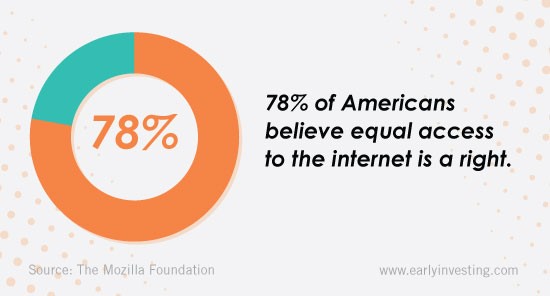On May 30, the California State Senate approved a bill (SB 822) that would allow the state to set and enforce net neutrality rules.
Proponents of the bill want to keep providers like AT&T and Comcast from altering internet connections to create paid “fast lanes” for specific companies.
The vote comes on the heels of the federal government’s repeal of the Obama-era net neutrality regulations.
The California vote seems to reflect popular opinion. A Mozilla/Ipsos poll released in April found 78% of Americans believe equal access to the internet is a right. Younger Americans believe even more deeply in net neutrality. The poll, which surveyed 1,007 Americans, found 84% of adults under age 35 believe equal access to the internet is a right.
I can’t help but see a parallel to cryptocurrency.
When SurveyMonkey and Global Blockchain Business Council conducted a joint poll of more than 5,700 adults in January, they found 5% own bitcoin. A majority of those bitcoin investors – 58%, to be exact – are between the ages of 18 and 34.
These younger generations of Americans have grown up with the internet. They’re accustomed to it. They’re used to having the freedom to access anything they can type into Google or another search engine.
It makes perfect sense that they would be receptive to cryptocurrency – a new form of money based on a decentralized network connected to the internet.
Young college graduates saddled with thousands of dollars in debt are struggling to make ends meet. In an economy already overburdened by debt, it’s no wonder they’re looking for alternatives.
Both cryptocurrency and the internet have been major forces of disruption. The internet has changed how we work, how we access media, how we go on dates and how we order takeout. Cryptocurrency is changing how we store value, how we approach transactions, how we view fiat currency and what we see as the future of money.
And just as the consequences of the repeal of net neutrality have yet to be fully realized, the consequences of regulating crypto (in whatever fashion) are unknown as well.
But one thing is certain: Young people – and young investors – are reshaping the landscape of our financial system. By embracing crypto, they are pushing it further down the path of adoption – much like they did with the internet.
And that’s the future we’re counting on.
Good investing,
Allison Brickell
Assistant Managing Editor, Early Investing
